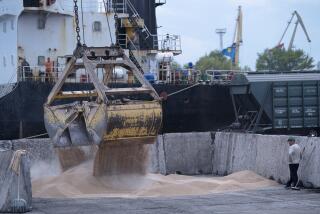Russian Oil Giant Suspends Merger With Troubled Yukos
- Share via
MOSCOW — In a move that appeared to stun even some senior managers, Russian oil giant Sibneft put its nearly completed merger with rival Yukos on hold Friday, delaying a deal that was expected to create the world’s fourth-largest oil company.
The decision raised questions about possible behind-the-scenes maneuvering by the Kremlin, which has in recent months moved to control the growing power of a potential $35-billion enterprise whose combined output would rival that of Kuwait.
Analysts also said Sibneft shareholders -- including tycoon Roman Abramovich, owner of London’s Chelsea soccer club -- might be looking for a way to negotiate a better deal or back out entirely after the arrest five weeks ago of Yukos’ then-chief executive, Mikhail Khodorkovsky, on fraud and tax-evasion charges.
The cryptic announcement threw the Russian financial community into turmoil, as neither Yukos nor Sibneft explained the reasons for the delay and financial analysts struggled to interpret it. Most believed that Abramovich, for various reasons, was attempting to kill the deal.
The value of Yukos shares fell 5.3%, to $11.36, and Sibneft slid 3.7%, to $2.35. But overall, Russian markets were down only about 2%, suggesting that the ramifications might be limited, at least financially.
Politically, however, the effects could be major. If the Kremlin is acting quietly to block the merger, it could indicate not only President Vladimir V. Putin’s discomfiture at the prospect of a single private company controlling so much of the nation’s oil wealth, but also the Kremlin’s unease with reported negotiations to sell up to a 40% stake in the combined new company to a major Western oil firm such as ExxonMobil.
In a country with notoriously opaque high-level political maneuverings, some analysts are even suggesting that Khodorkovsky may have sought to block the deal in the hope that easing the Kremlin’s fears about Yukos’ growing clout would help end his legal troubles.
“I think it was Khodorkovsky’s decision to prevent this merger at the last moment. He must have realized from prison what was going on outside the prison walls and must have passed this message to his partners,” said Yulia Latynina, an analyst with radio station Echo of Moscow.
In the only government reaction to the announcement, Economics Minister German O. Gref said there was “nothing tragic” about the suspension, adding cryptically that if the merger did not go through, “the risk related to the problems management of one company is having with taxes will subside.”
He emphasized, as Putin has on several occasions, that “the nationalization of Yukos is not an issue,” but that if company officials are found liable for damages, “those damages will be paid for in cash and other company assets.”
Prosecutors have frozen more than 40% of Yukos stock in preparation for such a scenario, but it appeared that key shareholder Leonid Nevzlin or others were able to vote those shares Friday in a decision to approve payment of a roughly $2-billion dividend to Yukos shareholders who held stock before the merger was initiated early last month.
Nevzlin, to whom Khodorkovsky is said to have entrusted control of his stock, has moved to Israel since the criminal case against Yukos was launched.
In an interview with the Interfax news agency, he said the merger was complete but still required the resolution of “some technical difficulties.”
“We decided to meet them halfway, in accordance with the existing agreements, and we took these questions off the agenda,” he said, referring to issues of completing the merger, amending the corporate charter and electing a new board of directors.
The $12-billion-to-$15-billion acquisition plan calls for a stock swap in which Yukos would acquire 92% of Sibneft’s shares in exchange for handing over 26% of Yukos and $3 billion in cash. Most of the transaction was completed in early October, and only the charter amendment and new board election were left to be dealt with at a meeting Friday.
But Sibneft representatives apparently surprised the gathering with an announcement of the decision to suspend the deal, a plan Sibneft spokesman Alexei Firsov said was agreed to by Sibneft and Yukos shareholders jointly before the meeting.
Yukos Chief Executive Simon Kukes, however, said he had not been notified of the suspension, and financial analysts who attended the meeting said Yukos officials appeared surprised by the news. Kukes “showed during the day that he has no clue what’s going on,” said Erik Wiegertz, deputy director of research at the UFG investment fund in Moscow.
Wiegertz and others offered several possible explanations of Sibneft’s decision. One is that Abramovich wants to back out of the deal because of worries that Yukos’ legal troubles could be costly and the belief that he would be better off holding out for a better deal or waiting to sell Sibneft to a foreign oil company.
Others have suggested that Abramovich -- who was allied with a business-friendly faction in the Kremlin that has lost much of its influence -- may have made peace with some of the hard-liners in government and is trying to help Khodorkovsky.
“It could suggest there’s a deal being cut [with the Kremlin], and this is the end of the onslaught against Yukos. He [Abramovich] would be the go-between,” said James Fenker, an analyst with Troika Dialog investment bank in Moscow. The Kremlin is probably trying to keep the oil conglomerate “a manageable size,” Fenker said.
“I would call it a power issue,” he said. “The power of a company such as YukosSibneft would be absolutely enormous in Russia. People talk about it as a state within a state.”
*
Times staff writer Sergei L. Loiko contributed to this report.
More to Read
Sign up for Essential California
The most important California stories and recommendations in your inbox every morning.
You may occasionally receive promotional content from the Los Angeles Times.













